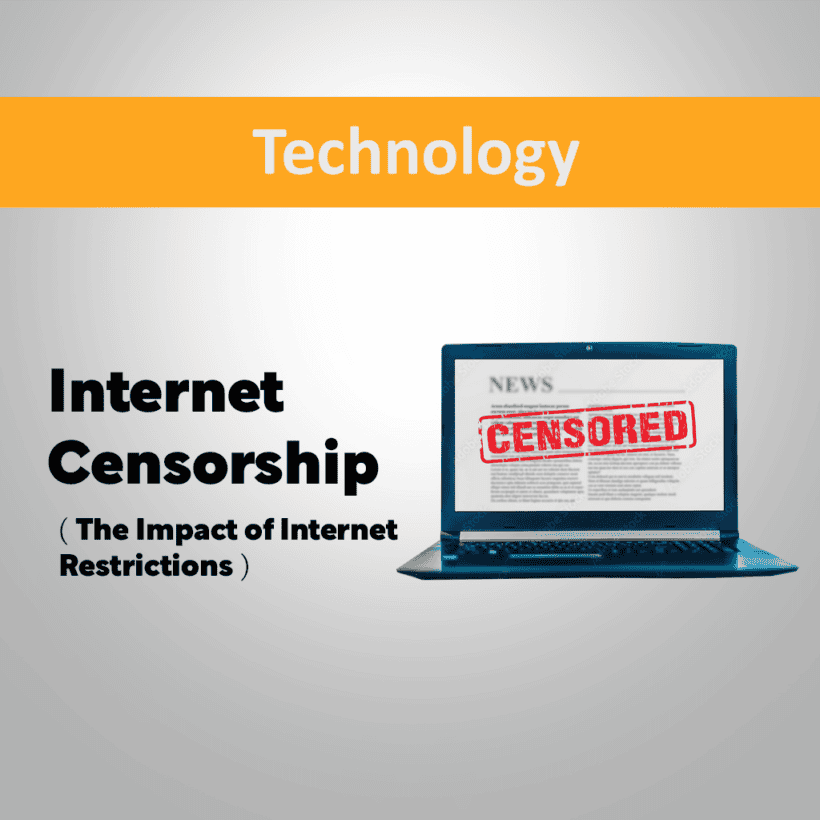In today’s hyper-connected world, the internet serves as the lifeline of communication, education, commerce, and free expression. Yet, digital freedom is far from guaranteed. Global internet censorship has become a pressing issue, affecting billions of people and reshaping the online landscape. From platform access restrictions to mass surveillance and government-imposed internet shutdowns, digital repression is on the rise.
This article explores the current state of global internet censorship, the countries most affected, the role of technology companies, and the implications for the future of free speech and digital rights.
What is Internet Censorship?
Internet censorship refers to the control or suppression of what can be accessed, published, or viewed online by governments, corporations, or other entities. It is the practice of prohibiting or suppressing certain online content. When a type of content is censored, it generally becomes illegal and near-impossible to access or view as long as you’re within the jurisdiction of the censoring body. In some instances, publishing censored content is also illegal.
The Global Landscape of Internet Censorship
- China: China doesn’t just have a Great Wall. They also have the Great Firewall, which controls the internet usage of anyone in their country. It blocks out popular foreign services as well as all traffic entering the country, severely reducing what individuals can view. It also filters traffic by keywords, preventing its residents from searching, discussing, and viewing information regarding contentious events, including the 1989 Tiananmen Square protests. citizens are directed to state-controlled sites like WeChat, Weibo, and Baidu. AI monitoring systems and aggressive content moderation are the norm.
- North Korea: The internet is almost entirely inaccessible to the general public. Only government-approved individuals can browse a tightly controlled intranet.
Internet Shutdown and Kill Switches
A growing tool in the censorship arsenal is the internet shutdown, a deliberate disruption of internet or mobile services. Governments routinely excuse these as measures of national security, but they are widely condemned for their infringement of human rights.
More than 60 nations have enforced shutdowns, as indicated by Access Now, since 2016. Among these consequences are:
- Disturbed communication in emergencies
- Economic losses amounting to millions
- Restriction of activism and protest movement
The Role of Big Tech
In the evolving narrative of digital freedom and online censorship, the role of Big Tech has become increasingly central and controversial. These global technology conglomerates, Google, Meta (formerly Facebook), Apple, Amazon, Microsoft, and Twitter (now X), have grown into entities with immense power over what billions of people can see, say, and do online. Originally conceived as technologies for bridging individuals and bringing information closer to the people, these technologies have now become the gatekeepers of contemporary communication. Their choices, active and passive, control the digital rights environment of the 21st century directly.
Big Tech’s power to influence internet censorship stems from a multifaceted convergence of market growth, compliance with governments, moral obligation, and profit. Working across borders, such businesses are subject to the jurisdictions of countries where they operate, and most of these require differential levels of control over online content. In repressive regimes, this may involve silencing opposition voices, deletion of politically charged content, or facilitating state monitoring. In democracies, it may include content moderation to halt disinformation, hate speech, or offensive conduct. Wherever they are, the distinction between responsible content management and direct censorship is getting fuzzier.
China Role in Censorships:
One of the best illustrations of this tension is the way that these businesses react to government pressure in non-democratic countries. China, the largest internet market in the world, is a case in point. Google’s exit from the Chinese marketplace in 2010 was a symbolic protest against censorship following the firm’s refusal to proceed with filtering results under government orders. But years later, leaked memos showed that Google had secretly developed a censored search engine project for China, code-named “Dragonfly.” The project, which would have enabled the Chinese regime to blacklist search terms and track user activity, was widely criticized and was abandoned after internal outcry. The incident points to the continuing conflict between human rights and market access that technology firms must navigate in repressive regimes.
At the same time, corporations such as Apple and Facebook have also had to thread this needle. Apple, for instance, has come under fire for expelling VPN apps from its Chinese App Store, technology commonly employed by citizens to evade censorship. In Russia, Apple and Google were pressured by the state to delete a voting app developed by supporters of opposition leader Alexei Navalny only days before parliamentary elections. The firms acquiesced, reportedly at risk of being prosecuted criminally against local staff. Opponents say such concessions create a perilous precedent and indicate that even the most dominant tech leaders can be contorted by authoritarian pressure when sufficient force is applied.
India Role in Censorship:
In India, another major tech battleground, platforms find themselves increasingly wedged between huge user bases and emerging regulatory frameworks that call for greater state control. India’s IT Rules, which were enacted in 2021, mandate social media sites to hire local grievance officers, determine the source of messages (undermining encryption), and comply with takedown notices within strict timelines. The Meta-owned WhatsApp has contested the rules in court on the grounds that they compromise user privacy by interfering with end-to-end encryption. This reflects a broader challenge faced by encrypted platforms: balancing compliance with state laws while protecting user rights and digital confidentiality.
Conclusion
The battle over global internet censorship is not just a technological issue, it’s a human rights crisis. While censorship may silence dissent in the short term, the long-term impact is devastating: a less informed, less free, and less connected world.
It’s time for collective action to protect digital freedom, because when the internet is censored, democracy is compromised.


